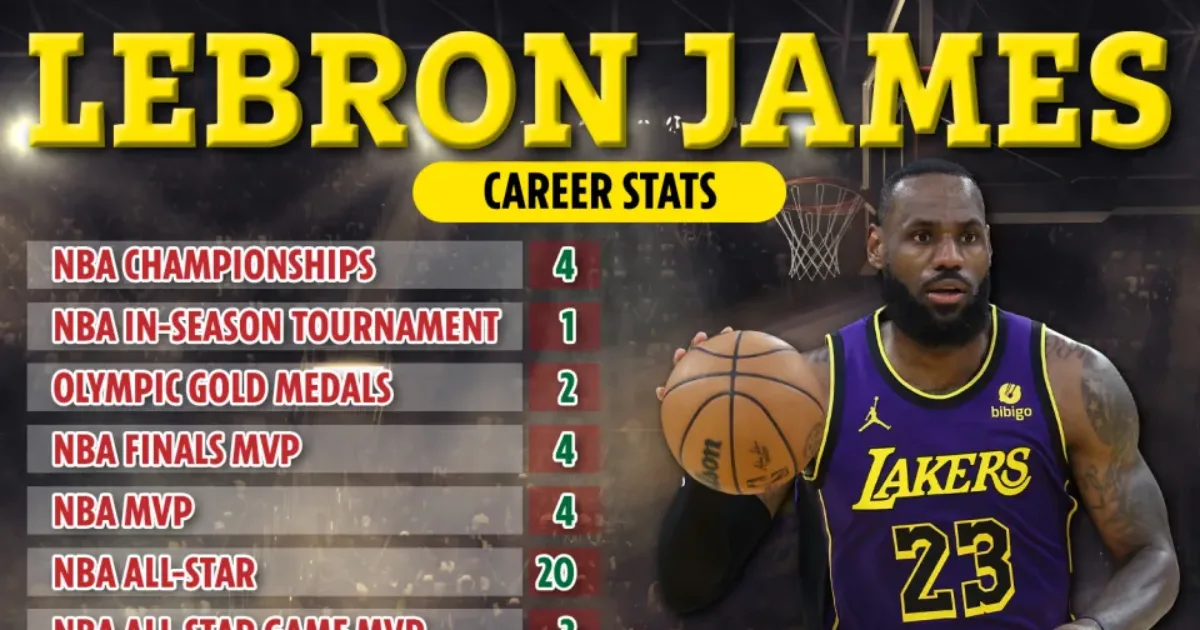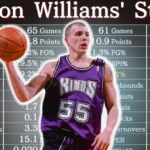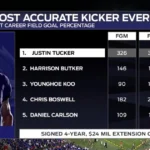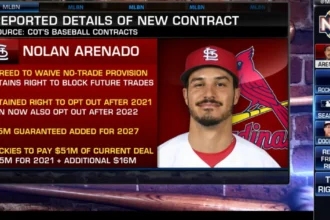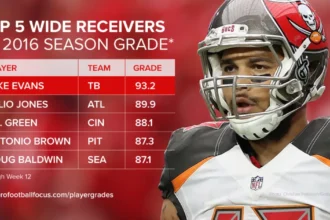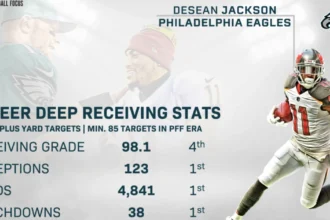Hey there, basketball fans—or maybe you’re just someone who’s heard the name Lebron James Career Stats tossed around like it’s synonymous with greatness. If you’re picturing a kid from Akron, Ohio, who turned into a global icon, you’re in the right place. LeBron isn’t just a player; he’s a phenomenon. At 40 years old in the 2025-26 season, he’s still lacing up for the Los Angeles Lakers, defying Father Time with moves that make you wonder if he’s secretly sipping from the fountain of youth. Today, we’re diving deep into his career stats—not with dry spreadsheets, but with stories that make those numbers pop. Whether you’re a die-hard hoop head or just curious about why everyone’s calling him “The King,” this is your easy guide. We’ll break it down season by season, spotlight his playoff magic, and wrap it with a handy table. Let’s tip off.
From High School Hero to NBA Rookie Sensation
Lebron James Career Stats burst onto the scene like a comet. Born on December 30, 1984, in Akron, he was already a legend by high school at St. Vincent-St. Mary. Scouts drooled over his 6’8″ frame, freakish athleticism, and basketball IQ that seemed decades ahead. In 2003, straight out of high school—no college detour—he got drafted No. 1 overall by his hometown Cleveland Cavaliers. Talk about pressure: The weight of a city on an 18-year-old’s shoulders.
His rookie year (2003-04) was no fluke. LeBron averaged 20.9 points, 5.5 rebounds, and 5.9 assists per game over 79 games. That’s triple-double threat territory right out the gate! He became the youngest player to score 50 points in a game (at 20 years and 20 days old) and snagged Rookie of the Year honors. Imagine being a teenager dropping dimes and draining jumpers against grizzled vets like Shaq and Kobe. It was like watching a video game character glitch into real life. Those early stats set the tone: efficiency, versatility, and a knack for elevating teammates.
The Cleveland Years: Building an Empire in Ohio (First Stint)
LeBron’s first seven seasons in Cleveland (2003-11) were a masterclass in growth. He wasn’t just scoring; he was orchestrating. By his sophomore year (2004-05), he bumped up to 27.2 points, 7.4 rebounds, and 7.2 assists. The Cavs went from lottery dwellers to contenders, thanks to his all-around game.
The peak? Seasons like 2008-09 and 2009-10, where he averaged over 29 points while leading the league in steals one year and efficiency the next. He carried Cleveland to the 2007 Finals—swept by the Spurs, sure, but at 22, he posted 22 points, 7 rebounds, and 6.8 assists per game. Critics called it “LeBronto” in later years for his Toronto takeovers, but it all started here.
Stats-wise, his scoring touchstone was consistency: He hit 25+ points in 16 seasons overall, a record for longevity. In Cleveland, he evolved from slasher to shooter, boosting his three-point percentage from 29% as a rook to 34% by 2010. But the ring eluded him, fueling “The Decision” in 2010—his move to Miami. Leaving Cleveland broke hearts, but those stats? They whispered promises of more.
Miami Heat: Rings, Heat Checks, and Superteam Glory
Ah, South Beach. Joining Dwyane Wade and Chris Bosh in 2010 turned the Heat into a dynasty machine. LeBron’s stats exploded in a good way—more assists, smarter shots. His 2012-13 MVP season? 26.8 points, 8 rebounds, 7.3 assists on 56.5% shooting. That’s surgical.
The real fireworks were the playoffs. In 2011, a Finals loss to Dallas stung (17.8 points per game, criticized for passing too much), but it forged “LeBron 2.0.” By 2012, he averaged 28.6 points and won his first ring, earning Finals MVP with a triple-double average (28.6/10.2/7.4). Then, back-to-back in 2013 against the Spurs—another FMVP, 25.3 points, 10.9 rebounds, 7 assists.
Miami’s “Big Three” era showcased LeBron’s evolution: From iso-ball to spacing the floor, his true shooting jumped to 64% in 2013. He won two MVPs here, but the stats tell a deeper story—fewer turnovers (3.0 per game average), more defensive anchors (led league in steals in 2013). It was basketball poetry: Heat checks after threes, chasedown blocks, and titles that silenced doubters. Four straight Finals? That’s not luck; that’s LeBron.
The Homecoming: Cleveland Cavaliers Round Two and the Miracle Shot
Returning to Cleveland in 2014 felt like a prodigal son story. Fans forgave “The Decision” overnight. LeBron’s stats stayed elite: 25.3 points, 6 rebounds, 7.4 assists in 2014-15. But the magic was in the moments—like that 2016 Finals comeback from 3-1 down against the 73-win Warriors.
In those seven games, LeBron averaged 29.7 points, 11.3 rebounds, 8.9 assists, and 2.6 blocks. Game 7? Triple-double (27/11/11) and the block on Andre Iguodala. He delivered Cleveland’s first championship, ending a 52-year drought. Finals MVP again, his third.
Across four seasons back in CLE (2014-18), he averaged 27.8 points and made four straight Finals. Stats highlight his do-it-all vibe: Career-high 9.1 assists in 2017-18, plus All-Defensive nods. He wasn’t just a scorer; he was a quarterback, turning scrubs into stars. By 2018, with 30,000+ points already, LeBron was rewriting longevity rules.
Lakers Era: Hollywood Drama, a Bubble Ring, and Father-Son Magic
Fast-forward to 2018: LeBron signs with the Lakers, chasing ring No. 4 in Tinseltown. Early years were rocky—injuries, bubble vibes—but his stats? Steady as ever. In 2019-20, he led the league in assists (10.2) at age 35, averaging 25.3 points and 7.8 rebounds. The Orlando Bubble playoffs? Lakers steamrolled to the Finals, where LeBron dropped 29.8 points, 11.8 rebounds, and 8.5 assists against Miami—FMVP No. 4.
Post-bubble, it’s been a grind: Western Conference Finals in 2020, but first-round exits since. Yet, at 40, he’s still averaging 25.7 points, 7.3 rebounds, and 8.3 assists in 2023-24, becoming the oldest to hit 25-5-5. In 2024-25, he notched 40,000 career points and played alongside son Bronny—the first father-son duo in NBA history. His shooting? 51% FG, 35% from three. Defensively, those chase-down blocks (all-time leader with 23 in one season) keep coming.
LeBron’s Lakers stats underscore adaptability: More playmaking (career 7.4 assists), fewer minutes (under 35 per game lately), but impact? Immense. He’s the anchor, turning Anthony Davis into a beast and mentoring the next gen.
LeBron’s Career Stats at a Glance: The Full Table
To make sense of two decades of dominance, here’s a comprehensive table of LeBron’s regular season per-game averages by year. I’ve focused on the core stats—points (PTS), rebounds (TRB), assists (AST), steals (STL), blocks (BLK), field goal percentage (FG%), and games played (G)—pulled from reliable NBA records up to the 2024-25 season. It’s easy to scan: Spot the MVPs, the peaks, and how he’s barely dipped entering his 40s. (Totals: 1,562 games, 27.0 PPG, 7.5 RPG, 7.4 APG.)
| Season | Team | G | PTS | TRB | AST | STL | BLK | FG% |
|---|---|---|---|---|---|---|---|---|
| 2003-04 | CLE | 79 | 20.9 | 5.5 | 5.9 | 1.6 | 0.6 | .418 |
| 2004-05 | CLE | 80 | 27.2 | 7.4 | 7.2 | 1.8 | 0.6 | .471 |
| 2005-06 | CLE | 79 | 31.4 | 7.0 | 6.6 | 1.6 | 0.8 | .480 |
| 2006-07 | CLE | 78 | 27.3 | 6.7 | 6.0 | 1.6 | 0.7 | .476 |
| 2007-08 | CLE | 75 | 30.0 | 7.9 | 7.2 | 1.8 | 0.8 | .489 |
| 2008-09 | CLE | 81 | 28.4 | 7.6 | 7.2 | 1.7 | 1.2 | .489 |
| 2009-10 | CLE | 76 | 29.7 | 7.3 | 8.6 | 1.6 | 1.0 | .503 |
| 2010-11 | MIA | 79 | 26.7 | 7.5 | 7.0 | 1.6 | 0.6 | .510 |
| 2011-12 | MIA | 62 | 27.1 | 7.9 | 6.2 | 1.7 | 0.8 | .542 |
| 2012-13 | MIA | 76 | 26.8 | 8.0 | 7.3 | 1.7 | 0.9 | .565 |
| 2013-14 | MIA | 77 | 27.1 | 6.9 | 6.9 | 1.6 | 0.3 | .567 |
| 2014-15 | CLE | 69 | 25.3 | 6.0 | 7.4 | 1.6 | 0.7 | .488 |
| 2015-16 | CLE | 76 | 25.3 | 7.4 | 6.8 | 1.4 | 0.6 | .496 |
| 2016-17 | CLE | 74 | 26.4 | 8.6 | 8.7 | 1.2 | 0.6 | .548 |
| 2017-18 | CLE | 82 | 27.5 | 8.6 | 9.1 | 1.4 | 0.9 | .542 |
| 2018-19 | LAL | 55 | 27.4 | 8.5 | 8.3 | 1.4 | 0.6 | .493 |
| 2019-20 | LAL | 67 | 25.3 | 7.8 | 10.2 | 1.2 | 0.5 | .493 |
| 2020-21 | LAL | 45 | 25.0 | 7.7 | 7.8 | 1.0 | 0.7 | .513 |
| 2021-22 | LAL | 56 | 30.3 | 8.2 | 6.2 | 1.3 | 1.1 | .524 |
| 2022-23 | LAL | 55 | 28.9 | 8.3 | 6.8 | 0.9 | 0.4 | .509 |
| 2023-24 | LAL | 71 | 25.7 | 7.3 | 8.3 | 1.3 | 0.5 | .540 |
| 2024-25 | LAL | 68 | 24.4 | 7.8 | 8.2 | 1.0 | 0.4 | .513 |
| Career | 1562 | 27.0 | 7.5 | 7.4 | 1.5 | 0.7 | .506 |
This table shows his wizardry: Notice the assist spike in Miami and LA? That’s point-forward evolution. FG% climbs with age—proof of smarts over athleticism. Gold career row? All-time records in points (40,474+), playoffs points (8,023), and more.
Playoff Dominance: When the Lights Get Brighter, LeBron Shines
Regular season stats are cool, but playoffs? That’s where legends etch their names. LeBron’s postseason line: 28.4 points, 9.0 rebounds, 7.2 assists over 292 games (18 appearances). He’s the all-time playoff scoring king, surpassing MJ in 2017.
Iconic runs: 2018 ECF vs. Boston (34 points, 9 rebounds, 9 assists average). 2016 Finals miracle. Even in losses, like 2018 vs. Warriors (33.0/9.6/8.4), he was a one-man army. At 39 in 2024 playoffs, 27.4 points and 8.3 assists. No one plays more minutes in Finals history (2,369)—that’s heart. His playoff FG%? 49.5, with chase-down blocks (0.8 per game) that swing series.
Awards and Milestones: Hardware That Stacks Like Bricks
LeBron’s trophy case is a museum. Four NBA titles (2012, 2013, 2016, 2020), four Finals MVPs (tied for second all-time), four regular-season MVPs (2009, 2010, 2012, 2013). Rookie of the Year (2004), 21 All-Star nods (and three MVPs there). All-NBA First Team 13 times—a record. All-Defensive First Team five times. J. Walter Kennedy Citizenship Award (2017) for his off-court work, like I Promise School.
Milestones? NBA all-time scoring leader (40,474 points). Only player with 30k points, 10k rebounds, 10k assists. Most 30-point games (672 reg + playoffs). Three Olympic golds (2008, 2012, 2024—MVP there too). In 2024, he hit 11,000 assists. At 40,000 points, he passed Kareem. These aren’t just numbers; they’re chapters in a GOAT debate.
The Intangibles: Longevity, Impact, and What’s Next
Beyond Lebron James Career Stats game is about IQ—he sees plays two steps ahead. His VORP (Value Over Replacement Player) leads NBA history at 156+. He’s top-5 in points, top-10 in assists/steals. Turnovers? High early (career 3.5), but he creates chaos.

